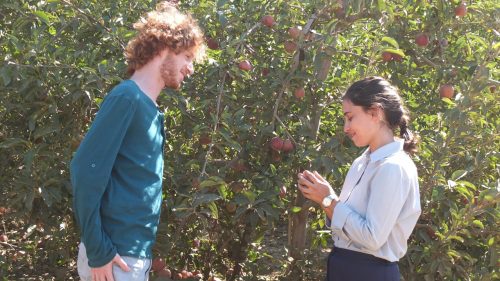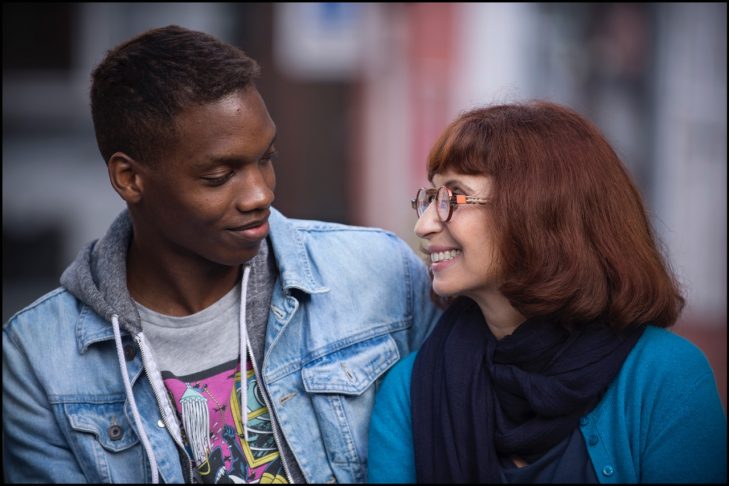The Boston Jewish Film Festival (BJFF) is back this summer with select encores from the November 2015 festival and a new $100,000 grant from Cummings Foundation. Founded by North Shore residents William and Joyce Cummings, the foundation awards 100 non-profits significant grants annually. This year the foundation cited BJFF for its innovative use of “film-based education to engage and educate participants of this annual November festival about genocide, prejudice, and social justice.”
In a phone conversation with JewishBoston, Jaymie Saks, BJFF’s executive director, said: “We are delighted and honored that the Cummings Foundation has acknowledged the work we do in the Holocaust and social justice areas. We share their commitment to bringing these issues to the public.”
Now in its 28th year, BJFF’s beginnings were humble. Filmmaker and founder Michal Goldman began by screening a few Israeli films at Boston University’s student union. Goldman’s hunch, that there was a hunger in Boston for these Israeli films, has proven to be right. Over the years the festival has garnered a reputation for bringing cutting-edge Jewish films—foreign and domestic—to Boston audiences. For the 2015 festival, the organization sponsored 60 screenings across 16 venues in Boston and the surrounding areas. What began as a seasonal venture now operates as a year-round organization.
Saks is enthusiastic about the upcoming summer offerings. “Many of the films will not have theatrical releases or go to Netflix, and we felt it was important to give them another chance to be seen,” she said. There are also two sneak previews on the roster that include a remake of “Ben Hur,” to be screened in August, and the July 17 premiere of “Indignation,” a film based on a Philip Roth novel. James Schamus, the film’s director and former CEO of Focus Features, will be on hand at the West Newton Cinema for a Q&A after the movie.
The summer mix of films represents places as far-flung as Bulgaria and South Africa. “Bulgarian Rhapsody” depicts a Bulgarian-Jewish family visiting their cousins in Greece against the background of World War II. While there’s a romance that takes center stage, the consequences of the war make for a stirring leitmotif. “Soft Vengeance” won the award for best documentary at the 2015 festival for its depiction of Albie Sachs, a Jewish, South-African activist who was at the forefront of the anti-apartheid movement early on. Sachs was instrumental in repealing apartheid, as well as in releasing Nelson Mandela. As a judge he also successfully legislated marriage equality in South Africa.
Other festival favorites and winners include “Apples from the Desert,” which opened to sold-out audiences and rave reviews on the opening night of the festival. The film is based on the classic short story by Savyon Liebrecht. Rivka, a young Orthodox Jewish woman, yearns to break free from her religious upbringing. Her rebelliousness has resulted in a suicide attempt when she was just 14. At 19, she’s an outcast in her community. Her curiosity about the secular world leads her to shyly participate in a forbidden co-ed dance class, where she meets Dubi, a secular kibbutznik.
Rivka runs away with Dubi to the Negev and embraces the kibbutz’s open lifestyle. Her frantic parents eventually locate her, and her mother comes to visit in secret. “Every culture and every family lives with kids breaking away from parents’ expectations,” said Saks. “The movie is a metaphor for a lot of coming-of-age stories. This is also a movie that will appeal to young adults, as well as to a larger audience. And Moran Rosenblatt as Rivka is radiant and beautiful in the part.”

“Once in a Lifetime,” a French film that won the audience award for best narrative film in November, is also on the BJFF’s summer docket. The Leon Blum High School is in a rough Parisian suburb, and history teacher Anne Gueguen is determined to engage her multicultural classroom of mostly African immigrants and Muslim students.
Nothing captures her students’ interest until she challenges them to come face-to-face with the atrocities of the Holocaust. The students initially resist their teacher’s lessons until they meet a French survivor of Auschwitz. Their attitudes quickly change, and a visit to a Holocaust memorial transforms their lives.
Gueguen also encourages her students to enter the National Contest of Resistance and Deportation—a contest that requires them to create a project based on the theme of “Children and Teenagers under the Nazi Regime.” Despite their long-shot odds of winning, the students persevere, and the results are both delightful and surprising.
Saks noted that the film is an example of how the Holocaust can be effectively taught. “Kids who have no interest in the subject can have their lives changed,” she said. “One of the kids in the original class became one of the screenwriters and acted in the film. And the film is mandated to be shown in all middle and high schools across France. For people who question what is going to happen to the history of the Holocaust when survivors fade away, this film is the answer to that.”
Find more information about these encore performances and purchase tickets here.



